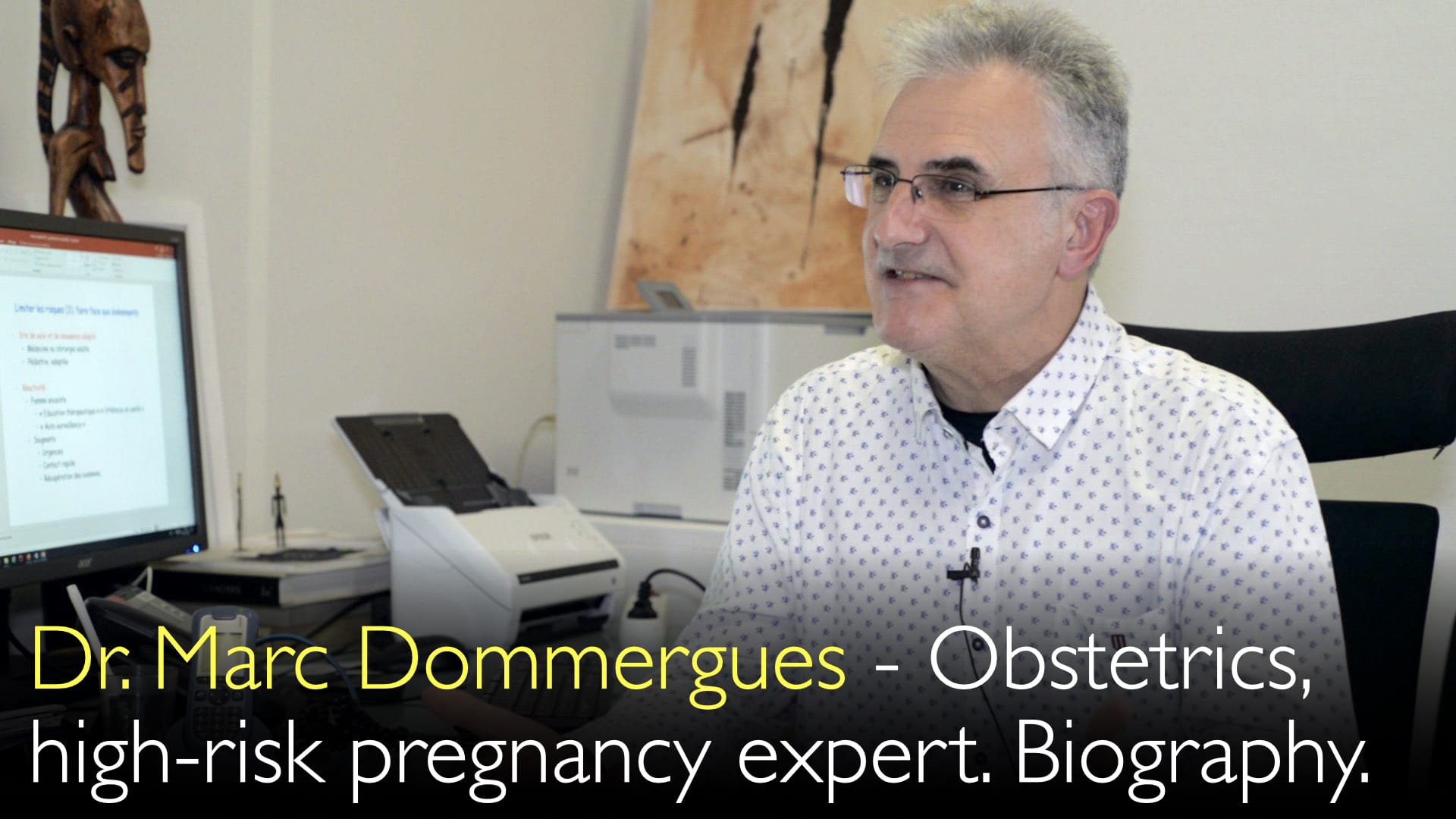周産期医学の権威であるマルク・ドメルグ医師(医学博士)が、慢性疾患を持つ妊婦の妊娠転帰への影響について解説します。産科合併症、疾患伝播、育児上の課題に伴うリスクを詳説し、母体と胎児の双方を守るための妊娠前計画と医学的管理の重要性を強く訴えます。
慢性疾患と妊娠:母体と児のリスク管理
セクションへ移動
母体疾患に起因する産科的合併症
慢性疾患は、妊娠中に重篤な産科的合併症を直接引き起こす可能性があります。マルク・ドメルグ医師(医学博士)によれば、抗リン脂質抗体症候群などの自己免疫疾患は、妊娠高血圧腎症、常位胎盤早期剥離、在胎不当過小児(SGA)の出産など、不良な妊娠転帰と強く関連しています。
これらの合併症は、母体の疾患が胎盤の発育や機能に影響を与えることで生じます。妊娠前および妊娠中の適切な疾患管理は、こうしたリスクを最小限に抑えるために不可欠です。
母体の急性合併症と早産
母体に急性の医学的緊急事態が生じた場合、医師が児を早産させざるを得なくなり、乳児に悪影響を及ぼす可能性があります。マルク・ドメルグ医師は、「私は子供のために死ぬ覚悟がある」と語る母親たちの心情に触れつつ、この考え方がかえって逆効果になり得ると指摘します。
例えば急性心不全などで母体の生命が危険にさらされている場合、医療チームは非常に早期の分娩誘発や帝王切開を余儀なくされることがあります。母体の救命に必要なこうした介入が、極端な早産による重大な新生児合併症を引き起こすリスクがあるのです。
児への疾患伝播
母体の疾患は、いくつかの経路を介して乳児に伝播する可能性があり、慎重な管理が必要です。HIVなどの感染症は、母体のウイルス量が十分に抑制されていない場合、母子感染を引き起こす可能性があります。幸い、現代の抗レトロウイルス療法(ART)により、この伝播リスクは劇的に減少しています。
抗体を介した伝播も別の経路であり、重症筋無力症や甲状腺疾患などで見られます。これらの場合、母体の抗体が胎盤を通過して新生児に影響を与えることがありますが、多くの場合その影響は一時的です。
遺伝性疾患と遺伝リスク
遺伝性疾患は、その遺伝形式や表現型の多様性により、妊娠において独特の課題を生じさせます。マルク・ドメルグ医師は、マルファン症候群を例に挙げています。これは常染色体優性遺伝形式をとり、子孫への伝播リスクが50%あります。
同医師は、遺伝性疾患には表現型の多様性があるという重要な点を説明します。マルファン症候群の家族内でも、ある成員は30歳で亡くなる一方、同じ変異を持つ別の成員は80歳まで生存する可能性があります。この多様性のため、遺伝カウンセリングは複雑になります。疾患遺伝子の保有が、特定の転帰を必ずしも約束するわけではないからです。
身体障害のある親の育児
身体障害がある場合、妊娠そのもの以外にも、育児における実践的な課題に特別な配慮が必要です。マルク・ドメルグ医師は、重度の運動障害がある場合、おむつ交換や授乳などの日常的な乳児ケアをどう提供するかという疑問が生じると指摘します。ただし、障害の重症度が必ずしも育児の成功を決定するわけではないと強調しています。
訓練や環境調整を通じた事前の準備により、多くの課題に対処可能です。興味深いことに、同医師は、身体障害のある方の育児の困難さは、多くの場合、障害自体よりも他の微妙な要因に関連していると観察しています。障害がなくても育児は困難であることを指摘しています。
親のメンタルヘルスと認知的課題
メンタルヘルスの問題や認知的障害は、特に複雑な育児上の配慮を必要とします。重度の精神疾患や知的障害は、妊娠前に話し合うことが難しい、極めて複雑な状況を生み出します。これらの状態には、専門的な支援体制が不可欠です。
しかしマルク・ドメルグ医師は、治療可能な精神疾患を有する女性に対して希望を示しています。適切な準備と治療を事前に行えば、妊娠の転帰は非常に良好となる可能性が高く、妊娠前のメンタルヘルスケアの重要性を強調しています。
妊娠前計画の重要性
妊娠前のカウンセリングと計画は、妊娠中の慢性疾患管理における共通のテーマです。アントン・チトフ医師(医学博士)との対話を通じて、ドメルグ医師の洞察は一貫して事前準備の価値を訴えています。遺伝的リスク、身体的制限、メンタルヘルスの懸念などに対処する際も、事前の計画が転帰を劇的に改善します。
この包括的なアプローチにより、医療チームは受胎のはるか前から伝播リスクへの対策を講じ、環境調整を実施し、薬物療法を最適化し、支援体制を整えることができます。この先行的な戦略は、親を志す慢性疾患を持つ女性のケアにおけるゴールドスタンダードと言えます。
全文書き起こし
マルク・ドメルグ医師(医学博士): 一部の医学的疾患は産科的合併症を引き起こす可能性があります。これはよく知られています。例えば、抗リン脂質抗体症候群は、妊娠高血圧腎症、在胎不当過小児(SGA)、常位胎盤早期剥離などの産科的合併症と関連しています。
また、あまり知られていないこと、あるいは知られていても母親たちが考えていないこともあります。例えば、母体に急性心不全などの急性合併症が生じた場合、医師が児を早産させざるを得なくなり、それが今度は児に悪影響を及ぼす可能性があります。
一部の母親は「私は子供のために死ぬ覚悟がある」と私たちに言います。私はそれが良い考えではないと伝えます。なぜなら、妊娠中に死亡のリスクに直面した場合、私たちは非常に早期に分娩誘発や帝王切開を行わざるを得ず、それが児に害を及ぼす可能性があるからです。
ですから、これがもう一つの問題―疾患に直接または間接的に関連する産科的合併症です。
次に、母親から子供へ伝播する可能性のある疾患の問題があります。伝播経路は多様です。例えば、母親がHIVに感染しており、ウイルス量が十分にコントロールされていない場合、感染が伝播するリスクがあります。
もちろん、現在では抗レトロウイルス薬(ART)により、母子感染のリスクは容易に管理できます。
別の例として、抗体が母親から児へ移行する場合があります。これは重症筋無力症や甲状腺疾患で起こり得ます。
さらに、遺伝的伝播のリスクもあります。将来の母親がマルファン症候群(遺伝性疾患)を有する場合、マルファン症候群の遺伝子伝播リスクは50%です。彼女はこの遺伝子を赤ちゃんに伝える可能性があります。
常染色体優性形式で遺伝する多くの疾患の問題は、表現型の多様性があることです。家族内で一人の患者は30歳で亡くなる一方、別の患者は同じ疾患の同じ遺伝子を持ちながら80歳まで生存するかもしれません。
ですから、疾患の遺伝子を保有していることが、特定の転帰を100%保証するわけではありません。これが難しい点です。
また、親であること(ペアレントフッド)に関する難しい問題もあります。疾患は様々な形で親であることと関わります。例えば、重度の運動障害がある場合、「どのようにして赤ちゃんに日常的なケアを提供できるか?」という疑問が生じます。これにはおむつ交換や授乳などが含まれます。
事前に予測し、訓練や環境改善を通じて備えることが極めて重要です。できることはたくさんあります。
興味深いことに、私たちの経験では、運動障害のある方の育児の困難さは、障害の重症度そのものよりも、おそらく他のより微妙な問題に起因することが多いようです。障害がなくても子育ては困難である可能性があります。
最後に、親に知的障害がある場合です。精神遅滞のある患者の親であることは、極めて複雑な問題であり、事前に話し合うことは非常に困難です。
重度の精神疾患を有する場合も、妊娠について事前に議論するのは難しいことがあります。一方、治療可能な比較的軽度の精神疾患を有する女性の場合、事前に適切に準備を整えれば、通常、妊娠の転帰は非常に良好です。
これが、妊娠に対する疾患の影響についての概要です。





